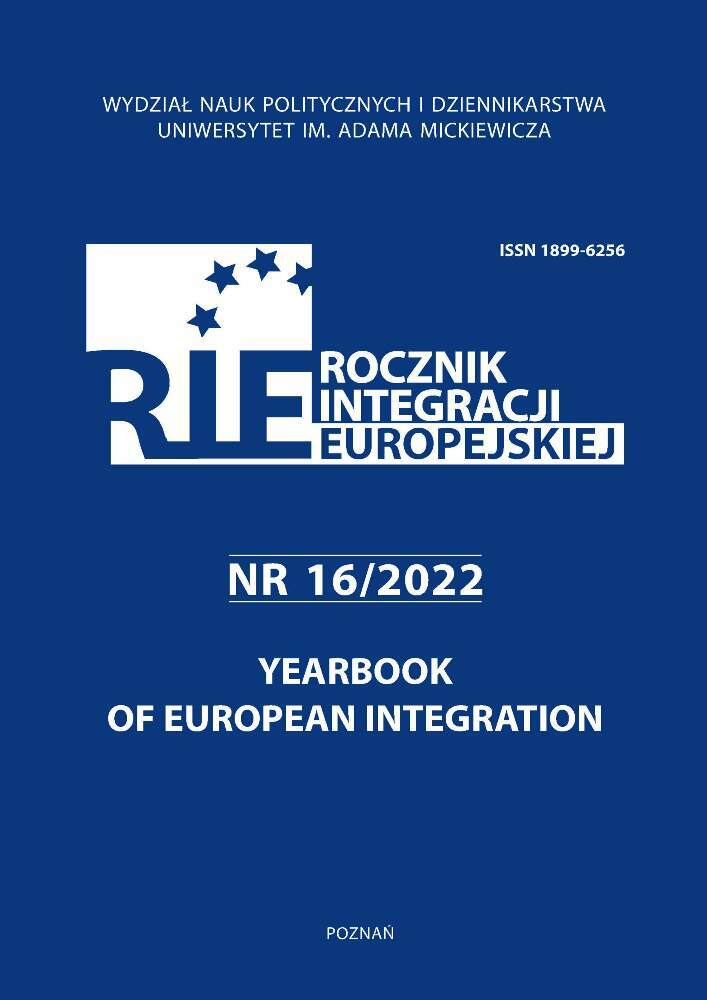Abstrakt
Celem niniejszego artykułu jest bliższe spojrzenie na politykę zewnętrzną Unii Europejskiej jako późnowestfalską innowację polityczną. W artykule przyjęto, że aktywność zewnętrzna Unii Europejskiej wykracza poza klasyczne ramy polityki zagranicznej, która jest zwykle uznawana za atrybut państwa, a sama UE jako podmiot hybrydowy, formułuje i realizuje politykę zewnętrzną. Ta ostatnia ma charakter normatywno-funkcjonalny, co oznacza, że podstawę obecności UE w świecie stanowi zbór określonych zasad, narzędzi i struktur organizacyjnych pozwalających na działania, które nie tylko uzupełniają politykę zagraniczną państw członkowskich, ale także wykraczają poza jej ramy. Późnowestfalska polityka zewnętrzna Unii Europejskiej opiera się na trzech filarach – multilateralizmie, normatywnej plastyczności, hybrydowości, które rozpatrywane kolektywnie tworzą obraz aktywności UE wykraczającej poza model klasycznej dyplomacji i współpracy międzypaństwowej.
Bibliografia
Barburska O. (2018), Jak jednoczyła się Europa, w: Unia Europejska. Istota, szanse, wyzwania, eds. E. Latoszek, M. Proczek, A. Szczerba-Zawada, A. Masłoń-Oracz, K. Zajączkowski, Warszawa.
Barnett M., Finnemore M. (2004), Rules for the World: International Organizations in Global Politics, Cornell University Press, Ithaca, NY.
Bátora J. (2013), The "Mitrailleuse Effect": The EEAS as an Interstitial Organization and the Dynamics of Innovation in Diplomacy, "Journal of Common Market Studies", vol. 51, Issue 4. DOI: https://doi.org/10.1111/jcms.12026
Bieliszczuk B., Biskup P., Znojek B. (2021), Specyfika i trendy w obsadzie personelu administracyjnego Europejskiej Służby Działań Zewnętrznych (2011-2019), PISM, Warszawa.
Biscop S. (2018), The EU and Multilateralism in an Age of Great Powers, Multilateralism in a Changing World Order, Konrad-Adenauer-Stiftung, Singapore.
Bouchard C., Peterson J. (2011), Conceptualising Multilateralism. Can We All Just Get Along?, Mercury E-paper no. 1.
Burgess M (2000), Federalism and European Union: the Building of Europe, 1950-2000, Routledge, London-New York.
Chojan A. (2012), Europejska Służba Działań Zewnętrznych - postęp czy regres w politycznej integracji Europy?, "Myśl Ekonomiczna i Polityczna", nr 1(36).
Cianciara A. K. (2017), Europejska Polityka Sąsiedztwa w perspektywie konstruktywizmu. Aktorzy, narracje, strategie, Wydawnictwo ISP PAN, Warszawa.
Czaputowicz J. (2007), Teorie stosunków międzynarodowych. Krytyka i systematyzacja, PWN, Warszawa.
Decyzja Rady (WPZiB) 2017/2074 z dnia 13 listopada 2017 r. w sprawie środków ograniczających w związku z sytuacją w Wenezueli, Dz. U. UE L 295, 14.11.2017.
Delors J. (1985), Speech by Jacques Delors (Luxembourg, 9 September 1985), "Bulletin of the European" Communities, September, no, 9, Office for official publications of the European Communities, Luxembourg.
Fiszer J. M. (2015), Unia Europejska dziś i jej niepewna przyszłość. Cz. I, "Rocznik Integracji Europejskiej", nr 9. DOI: https://doi.org/10.14746/rie.2015.9.3
Grosse T. G. (2022), Suwerenność i polityczność. Studium integracji europejskiej, Wydawnictwo Instytutu Wymiaru Sprawiedliwości, Warszawa.
Hanses B., Spence D. (2015), The EEAS and Bilateral Relations: The Case of the EU Delegation in the Democratic Republic of the Congo, w: The European External Action Service European Diplomacy Post-Westphalia, eds. D. Spence, J. Batora, Palgrave Macmillan, Houndmills, Basingstoke. DOI: https://doi.org/10.1057/9781137383037_17
Hawkins D. G., Lake D. A., Nielson D. L., Tierney M. J. (2006), Delegation and Agency in International Organizations, Cambridge University Press, Cambridge. DOI: https://doi.org/10.1017/CBO9780511491368
Held D., McGrew A., Goldblatt D., Perraton J. (1999), Global Transformations: Politics, Economics and Culture, Stanford University Press, Stanford, CA. DOI: https://doi.org/10.1057/9780333981689_2
Hix S. (2010), System polityczny Unii Europejskiej, przekład polski, tłum. A. Komasa, PWN, Warszawa.
Hooghe L., Marks G. (2020), A postfunctionalist theory of multilevel governance, "The British Journal of Politics and International Relations", vol. 22, Issue 4. DOI: https://doi.org/10.1177/1369148120935303
Keukeleire S., Thiers R., Justaert A. (2009), Reappraising Diplomacy: Structural Diplomacy and the Case of the European Union, "The Hague Journal of Diplomacy", vol. 4, Issue 2. DOI: https://doi.org/10.1163/187119109X440889
Konkluzje Rady w sprawie Planu działania UE dotyczącego praw człowieka i demokracji na lata 2020-2024, Bruksela, 18 listopada 2020, 12848/20.
Krause J. (2004), Multilateralism: Behind European Views, "The Washington Quarterly", vol. 27, Issue 2. DOI: https://doi.org/10.1162/016366004773097704
Kreuder-Sonnen Ch., Zangl B. (2015), Which post-Westphalia? International organizations between constitutionalism and authoritarianism, "European Journal of International Relations", vol. 21, Issue 3. DOI: https://doi.org/10.1177/1354066114548736
Kuźniar R. (2019), Między Zachodem a nie-Zachodem, czyli przyszły porządek międzynarodowy, in: Przyszłość międzynarodowego ładu liberalnego i rola Europy, eds. W. Kostecki, B. E. Nowak, K. Smogorzewski, Wydawnictwo AFiB Vistula, Warszawa.
Lavanex S. (2008), A Governance Perspective on the European Neighbourhood Policy: Integration beyond Conditainolity?, "Journal of European Public Policy", vol. 15, Issue 6. DOI: https://doi.org/10.1080/13501760802196879
Lazarou E., Edwards G., Hill Ch., Smith J. (2010), The Evolving 'Doctrine' of Multilateralism in the 21st Century, MERCURY E-paper no. 3.
Łoś-Nowak T. (2000), Stosunki międzynarodowe. Teorie - systemy - uczestnicy, Wydawnictwo Uniwersytetu Wrocławskiego, Wrocław.
Milczarek D. (2003), Pozycja i rola Unii Europejskiej w stosunkach międzynarodowych. Wybrane aspekty teoretyczne, Centrum Europejskie Uniwersytetu Warszawskiego, Warszawa.
Pietraś M. (2015), Teoria i praktyka reżimów międzynarodowych, czyli wartości, normy i instytucje w jednym, in: Normy, wartości i instytucje we współczesnych stosunkach międzynarodowych, vol. 1, eds. Ł. Fijałkowski, E. Stadtmüller, Wydawnictwo Rambler, Warszawa.
Pietraś M., Marzęda K. (eds.) (2008), Późnowestfalski ład międzynarodowy, Wydawnictwo UMCS, Lublin.
Rosamond B. (2018), The European Union, in: International Organization and Global Governance, second edition, eds. T. G. Weiss, R. Wilkinson, Routledge, London-New York. DOI: https://doi.org/10.4324/9781315301914-23
Ruggie J. (1992), Multilateralism: The anatomy of an institution, "International Organization", vol. 46, no. 3. DOI: https://doi.org/10.1017/S0020818300027831
van Ham P. (2010), Social Power in International Politics, Routledge, London. DOI: https://doi.org/10.4324/9780203857847
The Guardian (2011), The EU wants 'deep democracy' to take root in Egypt and Tunisia, 4.02.2011 r., "The Guardian", https://www.theguardian.com/commentisfree/2011/feb/04/egypt-tunisia-eu-deep-democracy, 2.05.2022.
Tomic N. (2013), Coordinative Discourses in Brussels: An Agency Model od Eu Foreign Policy Analysis, "Perspectives on European Politics and Society", vol. 13, Issue 2. DOI: https://doi.org/10.1080/15705854.2013.785265
White B. (2001), Understanding European Foreign Policy, Basingstoke-New York. DOI: https://doi.org/10.1007/978-0-333-98561-8
Zieliński M. (2014), Charakter prawny i zadania Europejskiej Służby Działań Zewnętrznych, "Państwo i Prawo", no. 10.
Zięba R. (2003), Unia Europejska jako aktor stosunków międzynarodowych, Wydawnictwo Naukowe Scholar, Warszawa.
Licencja
Prawa autorskie (c) 2022 Marek Rewizorski

Utwór dostępny jest na licencji Creative Commons Uznanie autorstwa 4.0 Międzynarodowe.

